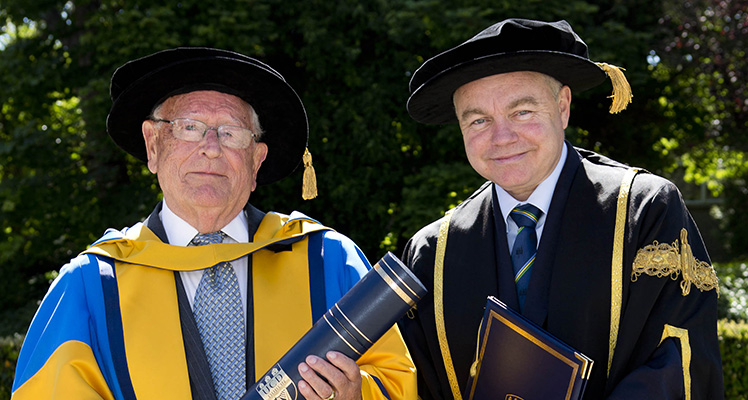First paediatric cardiologist in Ireland, Professor Conor Ward, awarded honorary degree

Posted June 07, 2016
- Professor Ward pioneered surgical methods of operating on children with complex heart defects
- The paediatric cardiologist also discovered a heart condition that can lead to sudden death
Professor Conor Ward who spearheaded the development of cardiology and cardiac surgery for children in Ireland has been awarded an honorary Degree of Doctor of Science by University College Dublin.
The award recognises Professor Ward’s contribution to paediatric medicine, medical education and research, but more importantly his “remarkable contribution to caring for sick children and their families”.
A medical student at UCD in the 1940s, Professor Ward (93) was in 1956 appointed Paediatrician and Paediatric Cardiologist at the newly founded (opens in a new window)Our Lady’s Hospital for Sick Children in Crumlin, Dublin. In 1970, he was appointed Professor of Paediatrics at UCD.
He is internationally recognised for his work on being one of the first doctors to identify an unrecognised condition that can lead to irregularities of the heartbeat and sudden death.
The international medical community acknowledged his pioneering work by naming Ward-Romano syndrome, a genetically inherited disorder of cardiac rhythm, after him.
Pictured top: Professor Conor Ward who was awarded an honorary Degree of Doctor of Science by UCD, and UCD President Professor Andrew J Deeks
The discovery led to advances in the understanding and treatment of the syndrome, which is one of the major causes of sudden cardiac death.
As the first paediatric cardiologist in Ireland, and one of the first internationally, he also spearheaded the development of cardiology and cardiac surgery services for children in Ireland.
A superb diagnostician, Professor Ward identified cardiac defects in ill babies at a time when many children died of what would now be considered minor cardiac abnormalities.
In Ireland, until then, these defects often went undiagnosed and were not repaired because of a lack of clinical knowledge and expertise.
Lovely to see Dr Cian Ward be conferred on the same day as his grandfather Prof Conor Ward receives an honorary degree
— UCD Medicine (@UCDMedicine) (opens in a new window)June 2, 2016
Professor Ward also pioneered surgical methods of operating on children who had often complex structural heart defects.
“His leadership resulted in cardiac services for children in Ireland becoming equal to or better than those which pertained in any other country,” said Professor Brendan Drumm, UCD School of Medicine, who delivered the citation at the award ceremony.
“He demanded excellence from everybody involved which he saw as imperative in terms of what children and their families should expect from those who cared for them.”
He also received lifetime service awards from the Down’s syndrome associations in Ireland and the UK due to his care for children with Down’s syndrome.
Through his research and writing, (including a PhD undertaken after his retirement) he is identified as the preeminent authority on the life of John Langdon Down who described the syndrome.
He wrote the book ‘John Langdon Down, A Caring Pioneer’, which was published by the (opens in a new window)Royal Society of Medicine and he received an award from (opens in a new window)The Society of Authors.
His work with families following Sudden Infant Death Syndrome has resulted in a much better understanding of the importance of ongoing support for these families long after the tragic event.
In the late 1980s, while at Our Lady’s Hospital for Sick Children in Crumlin, he was instrumental in improving the supports systems for the grieving parents of babies who had been the victims of sudden infant death syndrome.
By: Jamie Deasy, digital journalist, UCD University Relations






